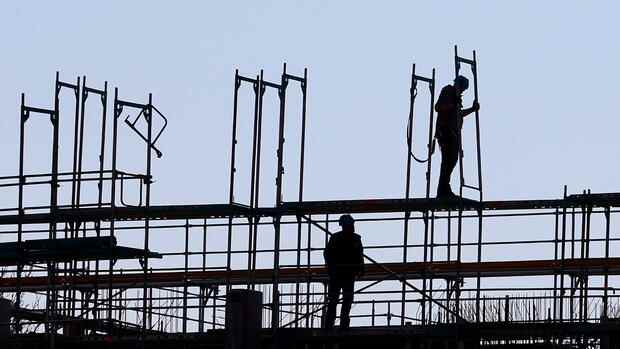Berlin It’s not just a lack of wiring harnesses for the auto industry: the war in Ukraine is now having a much more serious impact on the German economy. In some cases, entire supply chains are already collapsing.
But the even greater danger has so far been under the radar: business investment activity is about to be demolished. “We are in the middle of a broad investment freeze in many areas of the economy,” says Peter Adrian, President of the Association of German Chambers of Industry and Commerce (DIHK).
The uncertainty caused by the tense situation and the high energy prices are increasingly causing companies to postpone planned investments or want to cancel them altogether. This is a clear warning signal: Without new investments, the substance of an economy will suffer. They are the only prerequisite for sustainable growth.
The Ifo forecast from Wednesday considers it conceivable that German companies will not invest in new equipment such as machines or IT at all in 2022 if the economic situation continues to worsen.
>> Read here: ECB boss Lagarde sees permanently changed inflation dynamics
“Due to the current situation, companies have fewer and fewer incentives to invest,” warns Luc Frieden, President of the Association of European Chambers of Commerce and Industry (Eurochambres). On average, the four largest German institutes expect investment in equipment to grow by just 2.7 percent this year.
A frightening value when you look at history. Even before the corona crisis, Germany was suffering from an investment backlog. The need for investments is currently more urgent than ever, whether in climate-friendly technologies, digitization or for higher productivity, in order to cushion the loss of many workers due to demographic change.
In an international comparison, Germany lags far behind
However, the upheavals of the pandemic also meant that companies had to write off a significant proportion of their equipment. As a result, the growth in investment in equipment in 2020 was down for the first time in decades – and at minus 11.2 percent, it was no small one. The fact that the pandemic did not want to go away so quickly meant that investments rose only slightly in 2021.
The international comparison makes it clear that this is a specifically German problem. The projected growth in gross fixed capital formation in 2022 – which includes new buildings and warehousing in addition to equipment and which is more comparable internationally – is five times higher for the USA than for Germany. Even for the euro area, growth this year should be almost twice as high, according to the Halle Institute for Economic Research (IWH).
All the missing investments should now have been made up for. Originally, the forecasts for 2022 spoke of rates of around ten percent for investment growth. But no matter how the war goes on, one thing is already clear: These forecasts will be missed by a wide margin.
>> Read here: Hardly any growth, significant inflation: Bankers Association presents pessimistic forecast
And things are not looking good for 2023 either. The growth in investments in equipment is then forecast to be around eight percent on average.
However, economist Gabriel Felbermayr, member of the Advisory Board of the Federal Ministry of Economics, explains: “That is also the big difference to the corona crisis: If the war comes to an end at some point, higher energy prices and the uncertainty caused by a kind of Cold War 2.0 will probably remain.” Some investments will therefore made up for, but probably not all.
“Politics must open all floodgates”
In order to prevent at least some of this damage, economists are now calling for stronger investment incentives from politicians. The federal government has recently launched enormous state investments, above all an additional 100 billion euros for armaments expenditure. Berlin is also working on economic aid for companies that got into trouble as a result of the war.
But what is needed instead are structural adjustments, say experts. Ifo economic chief Timo Wollmershäuser fears that investment activity will remain well below the level before the corona crisis for a long time to come. Economist Felbermayr says: “Never has it been clearer than now: Politicians must pull out all the stops to make investments as attractive as possible.”
Eurochambres chief Frieden demands: planning and approval procedures would have to be accelerated in many more areas than the federal government is planning. So far, it has primarily aimed at expanding renewable energy. And there is no way around tax breaks, says Frieden, “if you are serious about transforming the economy”. His German colleague Adrian is calling for short-term measures, such as a reduction in the electricity tax.
According to the Ifo Institute 2022, the consequences of the Ukraine war are already slowing down the German economy. Wollmershäuser’s team only expects growth of between 2.2 and 3.1 percent for 2022. So far it had expected an increase in gross domestic product of 3.7 percent.
More: Ifo sees less growth – and significantly more inflation
